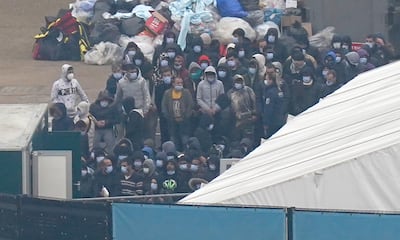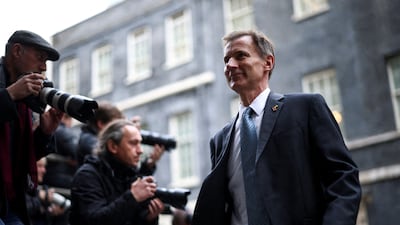Once seen as a shining example for other developed countries, Britain has seen its reputation as a leader in international aid suffer under budget cuts.
Jeremy Hunt, the Chancellor of the Exchequer, is set to outline more pressure to reduce the UK’s foreign aid cap from the current target of 0.5 per cent of gross national income — around £11 billion — in his Autumn Statement on Thursday.
In 2020, the budget was reduced from 0.7 per cent of GNI by Rishi Sunak, now Prime Minister, when he was chancellor due to Covid costs.
Ian Mitchell, a researcher at the Centre for Global Development, said a cycle of cuts and redirected spending was inflicting a heavy toll on the UK’s development programme.
“When we talk to partners in developing countries and policymakers in the G7 they prove that the UK has lost a significant amount of credibility,” he said.
UK development spending has actually overshot Mr Sunak’s current target. Money is being spent on housing for the soaring numbers of Channel migrants entering the UK via illegal routes as well as support for Ukrainian and Afghan refugees. Domestic costs will push designated overseas aid spending to 0.55 per cent of GNI this year, the BBC reported.
But MPs raised fears this week that the government could slash foreign aid to as low as 0.3 per cent in an upcoming austerity programme.
‘The UK’s soft power is being eroded’
The UK government has been warned of the long-lasting ramifications of its decision to allow about a quarter of the budget to be eaten up by domestic support for refugees and asylum seekers. More funds allocated to housing, catering, clothing and other support for newcomers means less cash for humanitarian projects overseas, campaigners say.
Afghanistan, Yemen, Pakistan, Ethiopia and Nigeria are the five biggest recipients of Britain’s bilateral aid.
Myles Wickstead, a professor in international relations at King’s College London who has extensive experience working on aid projects in African countries, expressed concern about a possible further reduction in the overall budget.
“There are still 30 or so very poor countries in the world which require aid,” he said. “In all those places, the UK’s reputation is high, it is seen in a leadership role [but] I think that reputation has suffered significantly.”
The former British Ambassador to Ethiopia, Djibouti and the African Union, who sat on the board of the World Bank from 1997-2000, said the Conservative government’s decision to reduce the foreign aid budget in recent years had dimmed the UK’s influence abroad.
“In the UK, I think it’s our ‘soft power’ that’s at risk here,” he told The National.

Mr Wickstead, a specialist adviser to the Parliamentary International Development Select Committee, said cash is vital for developing countries to implement economic programmes and policy reforms that will enable them to get out of poverty.
“Many of the countries which relied heavily on [UK] aid in the '60s, '70s and '80s no longer need it … because they’re standing on their own two feet and generating their own resources,” he said.
Mr Wickstead said foreign cash was vital to enable developing nations deal with the effects of climate change and respond to disasters caused by global warming. There are also “absolutely huge” healthcare, educational and hygiene needs in recipient countries, he said.
While he acknowledged the massive budget pressures the coronavirus crisis placed on the UK economy, he argued that the reduction from 0.7 per cent to 0.5 per cent was unmerited because GNI was lower than in previous years due to lockdowns. Therefore if the rate had been maintained the output would still have been less compared to pre-Covid times.
“The impact on the countries was huge,” he said of the cut. “They had their own Covid crises to deal with.
“We’re looking for glimmers of leadership and hope. The better off countries clearly have an obligation to support the countries which are less able to address these problems directly.”
The UN has since 1970 set a target of 0.7 per cent of GNI for donor countries to contribute to foreign aid. The necessity to reach the threshold was enshrined in UK law in 2015. While the commitment cannot be enforced, the government has to explain itself to MPs if it fails to reach the goal.
‘Countries are suspicious of UK aid’
Mr Mitchell’s research estimates that last year around £3 billion or a quarter of the aid budget was spent on hosting refugees in UK.
“It’s a very substantial amount of money,” he said. “Whether to count support for refugees [in the UK] as aid is another story. My view is that you should not. I would prefer to see countries stick to the formal definition of [foreign] aid rather than make up their own.”
In 2021 the UK spent £21,000 on each refugee it took in — the second-lowest amount among the 24-member Development Assistance Committee, data from the CGD shows.
Britain is grappling with an unprecedented migrant crisis and is expected to welcome its highest number of refugees and asylum seekers for 40 years, data shows.
But even as the UK takes in record numbers, its decision to temporarily reduce its cap on foreign aid has not gone down well with world powers, Mr Mitchell said.
“It’s very damaging to the UK’s bilateral partnerships,” he said. “I have been surprised [about the cut] in the post-Brexit world where the UK is trying to build up its relationships.
“It looks like the UK is not a serious partner. I think it’s harmful to the UK.”
Historically, the UK’s glowing reputation on international development was seen as one of its greatest assets in the global arena and garnered it a huge amount of respect from world powers. Much of that credit has been lost, according to Mr Mitchell.
“They are suspicious of UK initiatives over whether they will last. It’s a big change from five years ago when the UK was seen as a global leaders in international development. That has been eroded.”

‘It’s life or death for aid recipients’
Up to 250 million people are tipped to face acute food insecurity and be in urgent need of assistance, according to the World Food Programme and the UN Food and Agriculture Organisation’s midyear update published in October.
Yemen was listed as one of six hotspots where “humanitarian actions are critical in preventing further starvation and death”.
The eight-year-old war between Iran-backed Houthi rebels and the internationally recognised government has internally displaced millions of people and ignited a hunger crisis.
Kevin Meacham, who works with US-based non-profit Embrace Relief, said the situation in Yemen is dire and with no end in sight to the conflict the problems look set to persist. The organisation, which is funded by private donors, feeds 1,500 people in Sanaa each day. The bags of simple flatbreads mean the difference between starvation and having enough strength to get through the day for many Yemenis.
But he stressed there is a huge gap between the number of people seeking help and the amount being offered by foreign government-run programmes and NGOs.
“Demand is high,” he said. “There’s a great need for projects like ours. There’s always more people who are hungry. You always wish you could do more.
“It’s a human crisis and it’s a crisis that needs the support of the world community.
“For many people it is literally life or death.
“Without an end to the conflict it’s hard to see the situation stabilising. The conflict drives all the problems, the economic collapse, the potential famine. It’s the fuel in the fire.”


